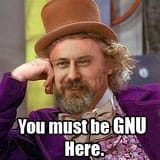>>106509627
>Where specifically in New York?
Brooklyn
> Which legal practice?
Not going to tell you
>
>You do realise that a separate contract that stipulates that they'll terminate their relationship with you if you breach its terms is fully within the federal and state statutes.
Violating copyright law is not fully within the federal statutes.
>
>A business has the right to terminate you as a customer. The GPL cannot force a business entity to provide their services to you.
Yes it can.
The Linux License could , if Linus et all wished it, stipulate that "you must provide anti-hack services for 1000 years to everyone, like a dog or a slave, or else you don't have a license to make derivative works of the Linux kernel". And then if you
1) made derivative works
and
2) didn't provide anti-hack services for (some amount of time*)
Linus et all could immediately sue for copyright infringement, and recover.
That is if they ever bothered to register their copyrights at all (they haven't).
(so no attorneys fees nor statutory damages are available to them)
*(Rule against perpetuity would likely stop this insane copyright license contract from reaching beyond 80 or so years, (also probably beyond the 30 year clawback provision in the federal copyright statute))
In the same vein;
The GPL can prevent you from prevailing on a claim of non-copyright infringement
"because my behavior is in line with the buisness agreement I have with someone else"
where that buisness agreement frustrates the purpose of the original copyright holders reason to give you a copyright license to begin with.
The reason linus gave out these copyright licenses was made clear by him: on video: and in emails: he said he wants _ALL_ contributions to come back to him.
That is why he attached the GPL memorandum to his copyrighted work.
It's a 1 page document, not completely integrated, this information would be noted by the courts.










